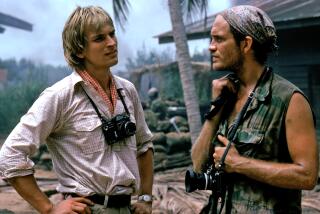Richard Irving; Director and TV Pioneer
- Share via
Richard Irving, who began producing and directing television films in 1950 when he made a long-forgotten movie for TV on a $4,000 budget, then garnered credits for such epics as “Masada” and “Wallenberg: A Hero’s Story,” has died in San Diego.
The former Broadway and film actor--who abandoned a brief career as a young dialogue director at RKO and moved to television in the aftermath of Howard Hughes’ takeover of that film studio--was 73 when he died Sunday in a San Diego hospital after heart surgery.
Brother of the late Jules Irving, former managing director of the Lincoln Center Repertory Theater, Irving amassed a series of successes while helping establish Revue Productions, the TV production subsidiary of MCA Universal.
Among them were the Gruen and Chevron Theater anthologies, “Pepsi-Cola Playhouse,” “Name of the Game,” “Columbo,” “Wagon Train” and dozens more.
He also directed the pilot films for “The Six Million Dollar Man” and “Cutter” and the miniseries “Seventh Avenue.”
In one six-month period in 1971, Irving had responsibility for 36 TV films. He had already established what was then believed a record 22 productions of the 90-minute “Mystery Theatre” in a single season (1949-50.)
In an era when motion picture studios refused to release their old films to television, not wanting to contribute to declining theater attendance, Irving and such pioneers as William Link, Richard Levinson, Norman Lloyd and a handful of others filled the small screen with dramas, mysteries and comedies.
All were a far cry from “The Little Pig Cried,” a 1950 TV adaptation of a radio script that Irving shot in one day on two sets at an old Hollywood studio.
It was a 30-page script, he recalled in a 1971 interview with Cecil Smith, then The Times’ TV critic and now retired.
“I rehearsed it like a play . . . did the first 18 pages on one set, then, for variety, shifted to the other set for the last 12 pages. . . . We did it straight through like a play, then went back and filmed close-ups until we ran out of film.”
If nothing else, it will be remembered as the first television film produced by what is now MCA Inc.
Irving was executive vice president of Universal TV until 1979, and after leaving directed “Wallenberg” and the miniseries “The Jesse Owens Story,” where researchers learned that the great Olympic track star had been suspended from amateur competition in 1936 for leaving a European tour to return to his wife.
A writer for the show helped launch a 1984 appeal to the Amateur Athletic Union, which reinstated Owens posthumously.
Most recently, Irving had directed the TV series “The Insiders” and “Hell Town” and produced the TV movie “The Last Days of Pompeii.”
Irving had been one of the first to advocate a system of TV repertory players to continue his prodigious output of films, but an uneasy peace with motion picture studios in the late 1960s brought old movies to the small screen and a subsequent cutback in original productions.
Irving’s survivors include his wife, Joanne, a daughter, a son, three stepchildren and seven grandchildren.
Services were held Wednesday at Hillside Cemetery.
More to Read
Only good movies
Get the Indie Focus newsletter, Mark Olsen's weekly guide to the world of cinema.
You may occasionally receive promotional content from the Los Angeles Times.








